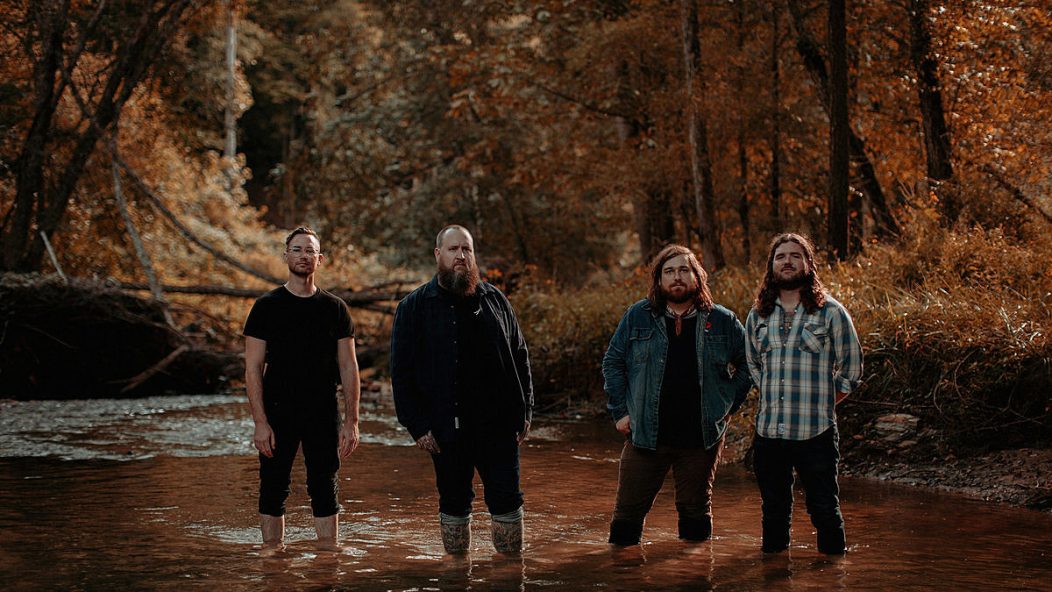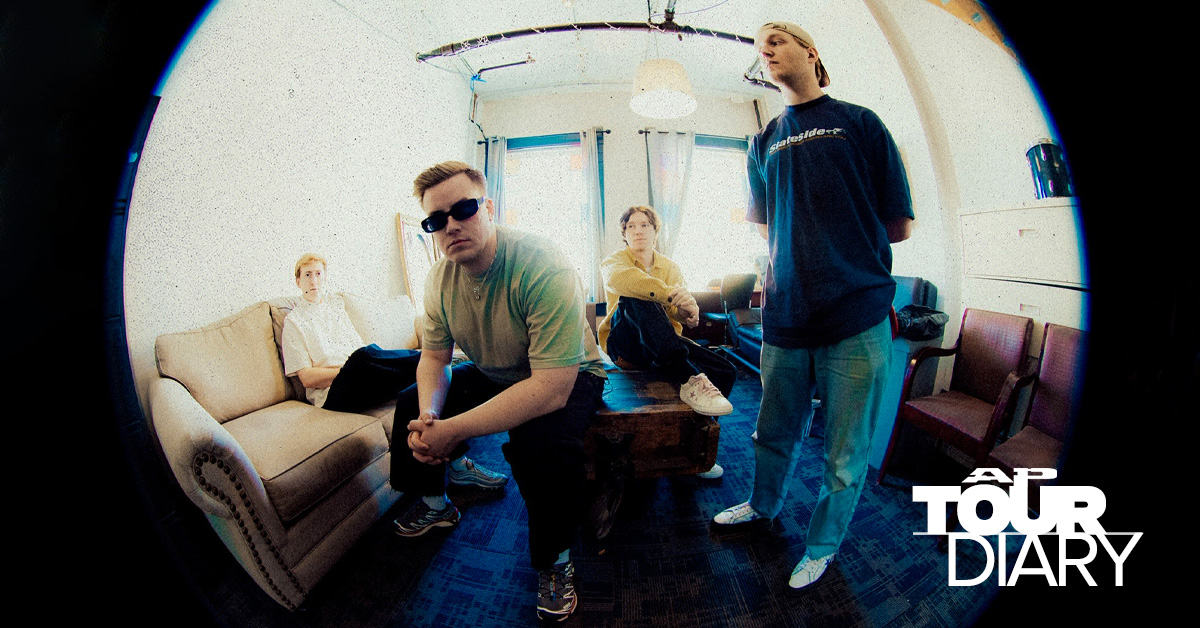
Basking in Progressive, Psychedelic Light with Scott and Zeb of Bask (Interview)

…
When I listed Bask‘s 2017 sophomore release Ramble Beyond as my favorite album of that year, it was no hyperbole. The band struck absolute musical gold with their blend of epic psychedelic rocking, stoner metal intensity, and southern rock spirit: it was a complete package for me, and the band’s increase in notoriety in recent years would seem to indicate many others felt likewise. Having spent a few years on the road with the likes of Pallbearer and Weedeater, Bask have honed their sound and their live performance to a fine edge, carving out an unmistakable niche within the greater “beard metal” oeuvre.
A little under three years later, Bask have graced us with a new full-length called III. This album sees the band settling into their ways, providing listeners with a lateral move rather than forward motion or inertia. Allow me to explain: some heavy bands such as Mastodon change so noticeably from release to release that, even as they still sound recognizably of that band, their respective albums often stand apart conspicuously. On the other hand, you have bands like Motörhead who release the same album year after year, but doing that so damn well you just don’t care. Bask opts for a third tack, making a record that sounds new and distinct from past albums while never sounding fully separate from them. They’re like the Melvins, in that sense: you can tell that they’ve matured and evolved, but where exactly isn’t entirely obvious. It’s a subtle approach, which befits the band’s overall vibe.
I can’t be the only one who hears Tool, Yes, and Opeth influences on this new one, can I? I don’t know for sure, but there are serious arena vibes to this record. One of Bask’s recurrent strengths is their ability to mix psychedelic mysticism with excellent, vibrant production values. All instruments hold their space in a manner that is cohesive while still individual, it’s a big, fresh studio recording in place of the garage-rock worship that too many psych bands fall into. And this time around, Bask really want to show their skills as a band: I think this is some of the most challenging music the band has written, though not once does this ever translate to boredom.
If you enjoyed Ramble Beyond, III will absolutely not disappoint you. It’s its own beast to be sure, more meandering and contemplative instead of bombastic, but the results are as evocative as ever, if not even more so. It’s the perfect soundtrack to next summer’s cross-country road trip, or even to this winter’s beautifully hazardous mountain drive.
I had the great privilege to speak with Bask drummer Scott Middleton and guitarist/vocalist Zeb Camp about their band history, their aesthetic, and how they achieve that big high lonesome sound, among other topics. III released today and can be streamed below.
…
…
Describe, in your own words, the formation of Bask. How did you come together and what were you doing beforehand?
Middleton: I met Ray [guitar, back-up vocals] in Asheville back in 2011 after being introduced by a musician friend as two guys who both wanted to play heavy music. Shortly after, we began jamming and started to write what would become a good chunk of [debut album] American Hollow. In the fall of 2013, we added Jesse on bass and Zeb on guitar and lead vocals. We played our first show in December of that year and have been hitting it ever since. Ray hadn’t been in Asheville very long and I was very new to town. The city and its music scene all drew us in and I think we all moved here with hopes of playing music.
Bask has an immediately recognizable sound, bearing elements of heavy metal but in large part drawing on southern rock tradition. Was the sound a conscious choice from the beginning, or did it evolve over time? Who brought what influences to the mix?
Camp: I think the bands development has been more intuitive than intentional. Ray and I were both born and raised in the South, but all of us grew up on classic rock. I think whether a band is from the U.K., Georgia, or Chicago, it’s hard to shake the influence that blues/folk/country, all of which being music with roots in the South, had on rock music in the middle decades of the 20th Century. I think southern rock makes its way into the songwriting on a subconscious level: I think it’s our otherwise wide and conflicting mix of influences that changes our approach and how we expand upon what might be, at its heart, Southern rock.
Middleton: We do try to stay conscious of our overall dynamics. There’s also a balance always being struck within the band between overanalyzing/playing something a million different ways and just playing what feels good and comes naturally. Both approaches are very valuable and have their respective moments when they seem to be more applicable.
Describe the visual and lyrical aesthetics of Bask. To me, it sounds like the aural embodiment of some form of New Appalachia, a place that combines the venerable old-time traditions with modern outdoors culture to create a sort of futuristic, hyper-aesthetic rusticism. What stories, if any, are you trying to tell through Bask’s music and visuals?
Camp: I’ve always had trouble writing from personal experiences. Some songs in our catalog are personal, but it’s been much more rewarding for me to try and engage with and interpret an existing story. Each song on III is inspired by a piece of legend, folklore, or mythology from various cultures and periods of history. I found myself re-examining these stories that I was culturally familiar with and focusing on the perspective of characters who were often overlooked. While writing the lyrics I felt emotionally connected to each story and tried to channel those feelings into first person narratives. Visually, I think the Appalachian futurism aesthetic that you’re picking up on has to do with how Appalachian and Southern music is globalized. Songs from Europe traveled to the mountains with immigrants and morphed into old time ballads and fiddle tunes played on instruments with origins and styles from Africa and Asia. I think that spirit has had a big impact on our process and the way we think about writing music.
…
…
I wrote an article a few years ago on the state of Asheville’s heavy music scene at the time, in which y’all were featured prominently. Everyone in Bask is involved in other notable Asheville projects consisting of a wide variety of musical styles. What are your extracurricular/double major bands, so to speak? Where do these other projects fit with regard to your personalities and with your experience as Bask?
Middleton: Jesse also plays bass in Black Mountain Hunger, which is an awesome atmospheric black metal band. I think with that band he gets some faster playing and a different kind of intensity out. Zeb sings and plays guitar in Rye, which is a cosmic country band; they’re very spacey and jammy within a country spirit. I play with Khandroma (two members from Rye), which is a droney, ambient, mostly improvisational trio. I also play when I can with Wounded Hollow, which is an ambient/jazzy noir-ish bass/synth and drum duo. Shoutout to my pals in Via, a great Asheville shoegaze/post-rock band whom I played with for more than a year!
Bask has received a substantial amount of critical praise since the release of “Ramble Beyond,” and a series of national tours with such notable bands as Pallbearer and Weedeater have boosted your profile considerably. How has the Bask experience grown with increased critical success and attention?
Middleton: Those two tours you mentioned are two of our favorites of all time. The Weedeater tour with Hyborian was very instrumental in our signing to Season of Mist two summers ago, which has been a tremendous boost and help for us. Big thanks to the Season of Mist team and all their help! We were able to meet the stateside team on our August tour and they’re all awesome and so supportive. These steps have helped us play some bigger shows and fests with bands we really enjoy and admire.
If y’all had to list five albums to get the unacquainted listener in the proper headspace for III, what would they be?
Camp: This will be wildly different for each of us, but here’s mine:
1. Kate Bush — The Kick Inside
2. Fairport Convention — Liege And Lief
3. The Decembrists — Hazards Of Love
4. Led Zeppelin — Physical Graffiti or maybe III
5. Doc Watson — Home Again
Middleton:
1. Mastodon — Leviathan
2. Mogwai — Mr. Beast
3. The War On Drugs — Lost in the Dream
4. Earth — The Bees Made Honey in the Lion’s Skull
5. Horseback — Half Blood
Describe your current gear setup, either for studio or for the road. What do you feel your respective gear, tones, and sounds bring to the greater Bask sound? And what sort of sound qualities do you try to achieve in either a live setting or on record?
Camp: My rig consists of a Fender AVRI Jazzmaster into an EHX Small Stone, Ibanez Tube Screamer, EHX Triangle Big Muff Pi, EHX Deluxe Memory Man, Roland RE-150 Space Echo and an OBNE Procession reverb into a Ceriatone JM (Dumble SSS Clone). My approach to guitar sounds in Bask is to provide space and balance to Ray’s guitar approach. Generally, my signal is clean more often than it is overdriven or distorted, and my space echo is almost always on. This record has a decent amount of vocal overdubs and a little bit of acoustic guitar and organ here and there but for the most part [recording it] was pretty much Bask live to Pro Tools. During the sessions for Ramble Beyond, we spent a lot of time chasing different guitar tones and sounds using different amps and guitars on different tracks and sections, but for III it’s just our live rigs and settings. I was honestly shocked at how smoothly it translated: it was probably aided through refining our live sound over the last couple years of touring.
Middleton: I use a Ludwig Vistalite kit both live and the record. The drums are acrylic and the kick is a 26″, with 14″ and 18″ toms. In general, I use bigger drums and cymbals as I can play them dynamically while also making the kit sound loud and huge. I can play a large cymbal quietly but I can’t get a small cymbal to sound enormous, which is my drum philosophy for this band in a nutshell. With this kit, I’m looking to have a classic-meets-modern sound of loud boomy-ness that can be either restrained or unleashed at the right times.
The final words are yours.
Middleton: Invisible Oranges is such an awesome site for the music community. Thanks for what you all do. We’d love to see you on the road soon!
…
III released today via Season of Mist.
…
Support Invisible Oranges on Patreon and check out our merch.
…








![Bad Omens announce new album CONCRETE JUNGLE [THE OST]](https://www.altpress.com/wp-content/uploads/2024/04/17/BadOmens-CROP_2024_JW_0619_Final_V1.jpg)


